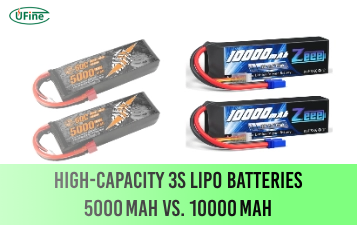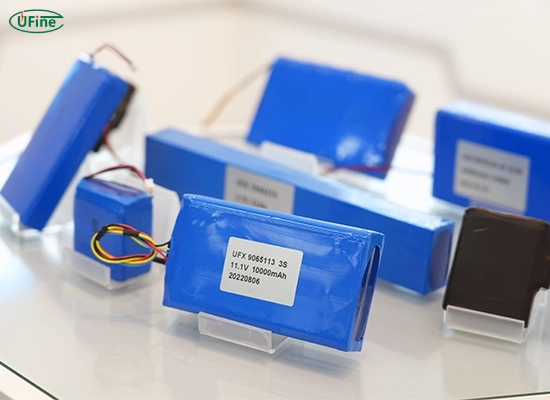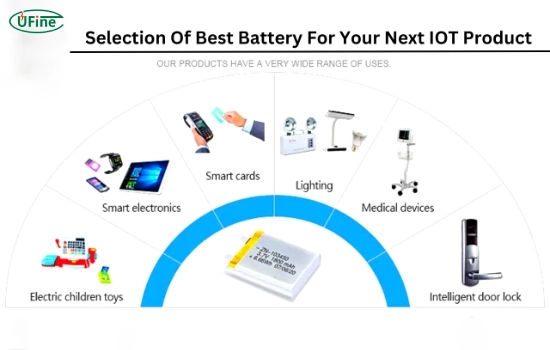The Internet of Things (IoT) has revolutionized how we interact with technology, enabling a seamless connection between devices and the internet. Central to the functionality of these devices are IoT batteries, which provide the necessary power for operation. This comprehensive guide will delve into the various aspects of IoT batteries, from their types and characteristics to their applications and maintenance.
Part 1. What are IoT batteries?
IoT batteries are specialized power sources designed to meet the unique requirements of IoT devices. These batteries must be compact, long-lasting, and capable of operating under diverse environmental conditions. They play a crucial role in ensuring the reliability and efficiency of IoT systems, including smart home devices, wearable technology, industrial sensors, and more.
Part 2. Types of IoT batteries
Lithium-Ion (Li-Ion) Batteries
Lithium-ion batteries power IoT devices with high energy density, low self-discharge rate, and reliability. They can be recharged and used in applications ranging from smartphones to smartwatches.
Lithium Thionyl Chloride (LiSOCl2) Batteries
LiSOCl2 batteries are known for their long shelf life and ability to operate in extreme temperatures. They commonly serve in industrial IoT applications where long-term reliability is critical.
Alkaline Batteries
Alkaline batteries are standard in low-power IoT devices. While they are not rechargeable, their low cost and availability make them popular for devices with low energy requirements.
Nickel-Metal Hydride (NiMH) Batteries
NiMH batteries offer a good balance between cost and performance. They are rechargeable and have a higher energy density than alkaline batteries, making them suitable for moderate-power IoT applications.
Part 3. Critical characteristics of IoT batteries
Energy Density
Energy density refers to the amount of energy a battery can store relative to its weight. A battery with a higher energy density can power a device for a more extended period without increasing its size.
Self-Discharge Rate
Self-discharge rate is when a battery loses its charge when not in use. IoT batteries with a low self-discharge rate are preferred as they retain their charge longer, ensuring the device is always ready for use.
Operating Temperature Range
IoT batteries must function efficiently across a wide range of temperatures. Batteries like LiSOCl2 perform well in extreme conditions, making them ideal for industrial applications.
Rechargeability
Rechargeable batteries like Li-Ion and NiMH are essential for high-power consumption devices. Users can recharge them multiple times, reducing the need for frequent replacements.
Part 4. Applications of IoT batteries
Smart Home Devices
IoT batteries power smart home devices such as thermostats, security cameras, and smart locks. These devices require reliable power sources to ensure continuous operation and connectivity.
Wearable Technology
Wearables, including fitness trackers and smartwatches, rely on compact and long-lasting batteries. Li-Ion batteries are commonly used in these applications due to their high energy density and rechargeability.
Industrial Sensors
Industrial IoT applications often involve sensors that monitor machinery, environmental conditions, and other critical parameters. Batteries like LiSOCl2 are preferred for their long life and ability to operate in harsh environments.
Healthcare Devices
IoT batteries are used in medical devices such as glucose monitors and wearable health trackers. These batteries must be reliable and safe, ensuring accurate and continuous monitoring of health parameters.
Part 5. How do you choose the correct IoT battery?
Assess Power Requirements
Understanding your IoT device’s power consumption profile is crucial. Devices with higher power needs may require rechargeable batteries, while low-power devices can use non-rechargeable options.
Consider Environmental Conditions
The operating environment plays a significant role in battery selection. For instance, devices in extreme temperatures or humid conditions need batteries to withstand such environments.
Evaluate Battery Life
Battery life is critical, especially for devices deployed in remote or hard-to-reach locations. Choosing batteries with longer life spans can reduce maintenance and replacement costs.
Size and Form Factor
The physical size of the battery must be compatible with the device. Compact batteries with high energy density are ideal for small IoT devices.
Part 6. Maximizing IoT battery life
Optimize Device Design
Efficient system design can significantly extend battery life. This includes optimizing power consumption, reducing unnecessary data transmissions, and using energy-efficient components.
Use Power Management Techniques
Implementing power management strategies, such as sleep modes and duty cycling, can help conserve battery life. These techniques ensure the device only uses power when necessary.
Regular Maintenance
Regularly checking and maintaining IoT devices can prevent issues that drain battery life. This includes updating firmware, checking software bugs, and verifying device calibration.
Part 7. Common challenges with IoT batteries
Limited Battery Life
Despite advancements, battery life remains a challenge for many IoT devices. This is particularly true for devices with high power demands or those operating in harsh conditions.
Environmental Impact
Battery production and disposal have environmental implications. Choosing eco-friendly batteries and implementing recycling programs can mitigate these effects.
Cost Considerations
High-quality batteries can be expensive, impacting the overall cost of IoT deployments. Balancing cost with performance and reliability is essential for sustainable IoT solutions.
Part 8. FAQs
-
What is the best type of battery for IoT devices?
The best type of battery depends on the specific application. Li-Ion batteries are famous for their high energy density and rechargeability. In contrast, LiSOCl2 batteries are ideal for long-term, low-power applications in harsh environments. -
How long do IoT batteries last?
The lifespan of IoT batteries varies depending on the type, device power consumption, and operating conditions. Rechargeable batteries like Li-Ion can last several years with proper management. In contrast, non-rechargeable batteries like LiSOCl2 can last up to 10 years in low-power applications. -
Can IoT devices use solar power?
Some IoT devices can use solar power as a supplementary energy source. Solar panels can extend battery life by providing additional power, especially in outdoor applications. -
How do I choose the correct battery for my IoT device?
Choosing the correct battery involves assessing the device’s power requirements, operating environment, battery life, and physical size. Consulting with battery manufacturers and considering your application’s specific needs can help you make an informed decision. -
Are there eco-friendly options for IoT batteries?
Yes, there are eco-friendly options for IoT batteries. Some manufacturers offer batteries with reduced environmental impact, and recycling programs are available to dispose of used batteries properly.
Related Tags:
More Articles

High‑Capacity 3S LiPo Batteries: 5000 mAh vs. 10000 mAh
Compare 3S LiPo 5000mAh vs 10000mAh batteries by weight, power, and use. Find the best fit for your drone, RC car, or boat setup.
Top 5 Applications for Small 3S LiPo Batteries
Small 3S LiPo batteries power drones, RC gear, wearables, and robotics with high energy and low weight. Making them ideal for compact electronics projects.
Building and Charging Your Own 3S LiPo Pack: A Step‑by‑Step Guide
Learn how to build, balance, and charge a 3S LiPo battery pack safely at home with this complete DIY guide for hobbyists and beginners.
How to Choose the Right LiPo Battery Plug Type?
Discover the best LiPo battery plug types, how to choose them, and expert tips for safe usage, soldering, and maintenance.
Choosing the Right Connector for Your 3S LiPo Battery
Choosing the right 3S LiPo connector depends on current, space, and use. Learn the pros and cons of XT60, JST, EC3, and more.





